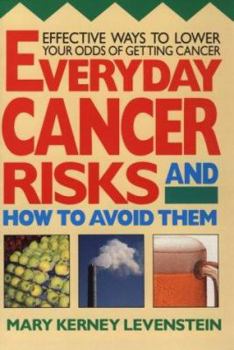Everyday Cancer Risk
Select Format
Select Condition 
Book Overview
Details the major cancer-causing problems we may unknowingly come face to face with on a daily basis, in our homes, our food, our environment, and our lifestyle.
Format:Paperback
Language:English
ISBN:0895295059
ISBN13:9780895295057
Release Date:January 1995
Publisher:Avery Publishing Group
Length:318 Pages
Weight:1.25 lbs.
Dimensions:0.9" x 6.0" x 9.0"
Age Range:18 years and up
Grade Range:Postsecondary and higher
Customer Reviews
1 rating
To be or not to be is to read or not to read
Published by Thriftbooks.com User , 20 years ago
(2 of 3 found this helpful prior to this revision) Being a constant reader of health letters and health books for over 30 years I find Levenstein's book worrisome, because I have read it 10 years late and have been unaware of some hazards and have misjudged the magnitude of others. Backed up by 24 pages of references (approx. 470 citations) she has created a highly permeable interface between the heavy-duty scientists and the rest of us who just want to know enough to be sufficiently motivated and informed so that we can protect ourselves. She is impressive in her 35 chapters of broad and skillful coverage of this broad topic and in her writing style which slapped me hard with persuasive truth many times and in her presentation of the compelling need for realistic action and in her providing of resources for guiding and assisting our action. Writers are famous for skipping "the elephant in the living room" in their books - could I criticize this one for skipping mind-body medicine - no - she digs right into it in her chapter on stress. She even wrote a chapter on protecting our pets from environmental hazards and from some pet foods which may contain even more potentially carcinogenic material than the foods most pet owners eat. I am reminded that our cancer vulnerability is primarily determined a) by what we do to ourselves with varying levels of awareness, and b) by what we are exposed to because of the actions of others (engaged in providing us products and services) who limit or distort our knowledge about the environmental and potentially carcinogenic impacts of their work and their products. As a result of two cancer cases in my family, of general self-education on cancer, of reading Levenstein's book, and of writing my own set of book notes, the following have become realizations for me: 1) Buying organic foods is more health-strategic than most of us realize.2) Cancer research works both ways for humans and rats - research on either, for a given carcinogen, often indicates likely cancer causation in the other. 3) One needs to develop and maintain throughout his/her life a plan for avoiding cancer with at least the same priority as plans for finances, education, career, child-raising and retirement. 4) It is more difficult, complex, and perhaps traumatic, to arrive at an understanding of the cancer-affected body and the methods and effects of cancer treatments than it is to arrive at an understanding of how most of us can prevent cancer. 5) The appetite of the masses for cheap electrical power has been stimulated far beyond our ability to produce that power while withholding carcinogens from the environment. 6) Industry has a simple bottom line - give the public what they want (or can be induced to want) or go into bankruptcy. Therefore, industry restraint in placing potential carcinogens in the air, earth, water and foods is impossible without the creation and enforcement of laws by an aware public along with its votes-sensitive public





